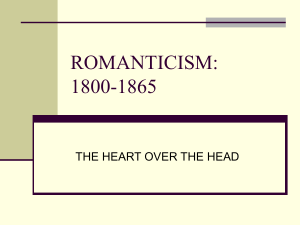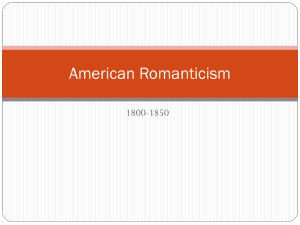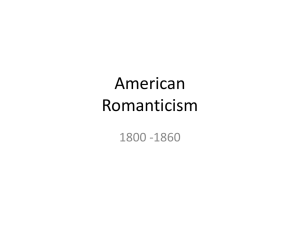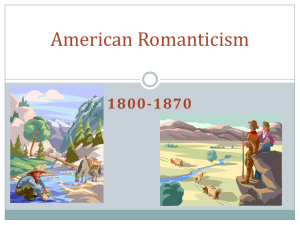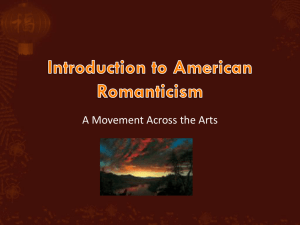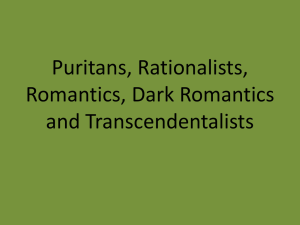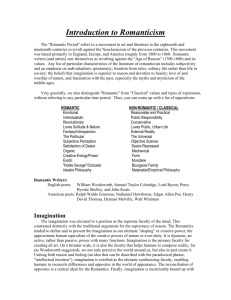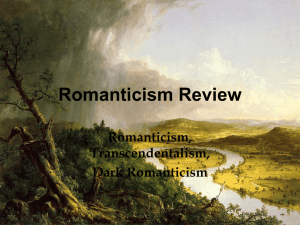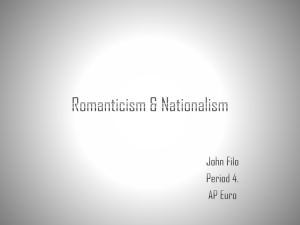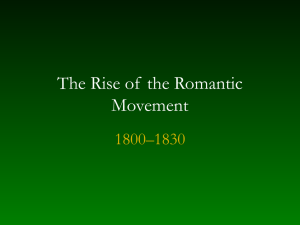American Romanticism
advertisement
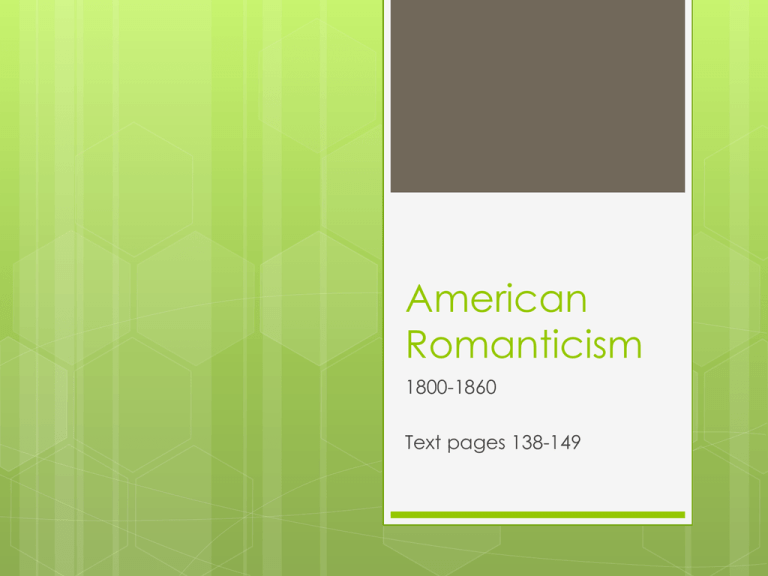
American Romanticism 1800-1860 Text pages 138-149 The journey- no pattern so common in all literature. Franklin wrote about his journey to Philadelphia in 1771 In 1799, Charles Brockden Brown described his trip in his Romantic novelArthur Mervyn In this a young farm boy left home looking for a place to make his dreams come true Found a plague-ridden urban world of decay, corruption, and evil (MUCH different than Franklin’s) The differences between these stories represents the differences between the views of the rationalists and those of the Romantics. To Franklin (and other rationalists), the city was a place to find success and selfrealization To Romantic writers the city was far from civilization- it was a place of shifting morals and corruption and death. The characteristic Romantic journey is to the country side Associated with independence, moral clarity, and healtful living Sometimes (like with E.A. Poe), the Romantic journey is a psychological voyage to the country of imagination Whatever the destination- flight from something and to something The Romantic Sensibility: Celebrating Imagination Romanticism is the name given to schools of thought that value feeling and intuition of reason Romanticism developed as mostly a revolt against rationalism Romantics believed imagination could discover truths the rational mind could not To Romantics, imagination, individual feelings, and wild nature were of greater value than reason, logic, and cultivation. Romantic Escapism: From Dull Realities to Higher Truths Romantics wanted to rise above “dull realities” to a realm of higher truth Two ways: - searched for exotic settings in the more “natural” past (or away from the grimy and noisy industrial age). Sometimes discovered this in old legends or folklore. - tried to reflect on the natural world until dull reality fell away to reveal truth and beauty. The American Novel and the Wilderness Experience Big question: Would American writers continue to imitate the English and European models, or would they develop a distinctive literature of their own? Romantic poets were staying close to traditional forms, but novelists were discovering different subject matter Development of the American novel coincided with westward expansion, growth of a nationalists spirit, and rapid spread of cities. A New Kind of Hero Franklin tried to change the stereotype of Americans being unsophisticated and uncivilized Romantics took no such pains Took insults from Europeans and made it the other way Said virtue was American innocence, not European sophistication Cooper’s Natty Bumppo is a triumph of American innocence and is one of the most important outgrowths of the early American novel: The American Romantic Hero The typical hero of American Romantic fiction was youthful, innocent, intuitive, and close to nature Still today lots of examples: Lone Ranger, Superman, Luke Skywalker, Indiana Jonesother western, detective, and fantasy heroes. Characteristics of the American Romantic Hero Young or possesses youthful qualities Innocent and pure of purpose Has a sense of honor based not on society’s rules but on some higher principle Has a knowledge of people and life based on deep, intuitive understanding, not on formal learning Loves nature and avoids town life Quests for some higher truth in the natural world American Romantic Poetry: Read at Every Fireside Claimed to look for new subject matterbut the opposite tendency appears in their works Used American settings/people, but used European techniques Wrote in a style that a cultivated person from England who had recently immigrated to America might be expected to use. Fireside Poets (a group of poets from Boston)- became the most popular poets America produced Called Fireside because their poems were read by firesides all over America Also called Schoolroom Poets because they were memorized by school children The Transcendentalists: True Reality Is Spiritual The heart of America’s coming-of-age were the Transcendentalists (led by Ralph Waldo Emerson). Transcendental refers to the idea that in determining the ultimate reality of God, the universe, the self, and other important matters, one must transcend, or go beyond, everyday human experience in the physical world For Emerson, Transcendentalism was not a new philosophy but “the very oldest of thoughts cast into the mold of these new times.” The “oldest of thoughts” was idealism Idealists said that true reality was found in ideas rather than in the world perceived by senses Americans who called themselves Transcendentalists were idealists but in a broader, more practical sense Emerson and Transcendentalism: The American Roots Though he was skeptical of the Transcendentalists’ ideas and projects, he was the most influential and best known member of the group Its American roots included the Puritan thought, the beliefs Jonathan Edwards, and the Romantic tradition exemplified by William Cullun Bryant Emerson’s Optimistic Outlook His mystical view did not come from logic, but intuition - our capacity to know things spontaneously and immediately through our emotions rather than through our reasoning abilities An intense feeling of optimism was one product of Emerson’s belief that we can find God directly in nature His optimism and hope appealed to audiences who lived in economic downturns, regional strife, and conflict over slavery The Dark Romantics Emerson’s idealism was exciting for his audience Not all writers and thinkers agreed with him Some think Hawthorn, Melville, and Poe are anti-Transcendentalists because their views of the world seem so different from the views of Emerson and his followers Actually had a lot in common: - valued intuition over logic and reason - saw signs and symbols in all events Dark Romantics didn’t disagree with Emerson’s belief that spiritual facts lie behind the appearance of nature; just did not think those facts are necessarily good or harmless Their view of existence developed from both the mystical and melancholy aspects of Puritan thought In their works, explored the conflict between good and evil, the psychological effects of guilt and sin, and even madness in the human psyche Characteristics of American Romanticism Values feeling and intuition over reason Places faith in inner experience and the power of the imagination Shuns the artificiality of civilization and seeks unspoiled nature Prefers youthful innocence to educated sophistication Champions individual freedom and the worth of the individual Reflects on nature’s beauty as a path to spiritual and moral development Looks backward to the wisdom of the past and distrusts progress Finds beauty and truth in exotic locales, the supernatural realm, and the inner world of the imagination Sees poetry as the highest expression of the imagination Finds inspiration in myth, legend, and folklore

